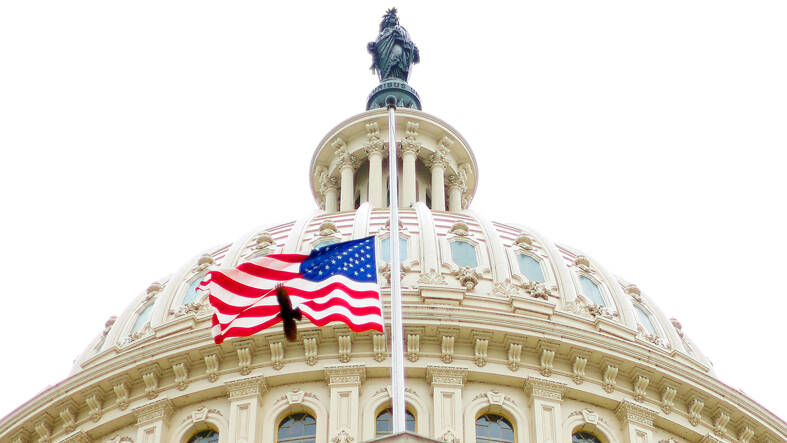The US Senate Foreign Relations Committee on Thursday passed the Taiwan Tax Agreement Act amid growing advocacy for the US government to enter into negotiations with Taiwan on the avoidance of double taxation.
The bill was originally proposed in May by US senators Robert Menendez, Chris van Hollen, Jim Risch and Mitt Rommey.
However, the bill passed by the committee came from a revised version presented on Thursday by Menendez, chairman of the Senate Foreign Relations Committee.

Photo: Reuters
The bill would authorize the American Institute in Taiwan (AIT) and the Taipei Economic and Cultural Representative Office (TECRO) to negotiate a tax agreement in a bid to deal with double taxation issues, which Taiwanese investors in the US have sought to have changed.
The bill describes Taiwan as one of the largest trading partners of the US, as well as one of the world’s largest economies.
It says closer economic relations with Taiwan remain critical, in particular given Taiwan’s strategic importance and the increasing threat posed by China.
“A tax agreement with Taiwan would play a key role in facilitating and promoting increased bilateral investment and trade between the United States and Taiwan, fortifying the relationship between the two more generally, and encouraging other nations to increase their economic linkages to Taiwan,” it says.
It also stipulates that a future tax agreement would apply to tax residents of Taiwan and the US, but exclude enterprises headquartered in China or in a third country that does not have a comprehensive income tax treaty with Washington.
The US has signed tax agreements covering 65 jurisdictions to facilitate economic activity, boost bilateral cooperation, and benefit US businesses and individual taxpayers.
The US president would be required to provide written notification to the “appropriate congressional committees” of the commencement of negotiations between the AIT and TECRO on a tax agreement at least 15 calendar days before such commencement, the proposed legislation says.
Not later than 90 days after commencement of negotiations on the agreement, and every 180 days until the conclusion of the agreement, the US president would be required to provide a briefing to congressional committees providing an update on the status of negotiations, including a description of elements under negotiations, it says.
The committees involved would be the foreign relations, Senate finance, foreign affairs, and ways and means committees, it says.
It stipulates that a tax agreement would not take effect until Congress approves it.
Review of the bill by the Senate Foreign Relations Committee had been scheduled for June 8, but was delayed twice to Thursday partly due to a boycott by US Senator Rand Paul, who raised concerns over taxpayer privacy.
Taiwan has urged the US to enter into negotiations to sign an agreement to avoid double taxation.
When President Tsai Ing-wen (蔡英文) met with a US delegation in Taipei on July 4, she told them that Taiwan hopes to negotiate an agreement on avoiding double taxation with the US, as it would encourage bilateral investment and trade cooperation, and create more opportunities for businesses from both sides.
AIT Chair Laura Rosenberger in Washington on Thursday last week said that double taxation avoidance was an issue high on the radar of US policymakers, as well as Tsai and her colleagues.

PREPAREDNESS: Given the difficulty of importing ammunition during wartime, the Ministry of National Defense said it would prioritize ‘coproduction’ partnerships A newly formed unit of the Marine Corps tasked with land-based security operations has recently replaced its aging, domestically produced rifles with more advanced, US-made M4A1 rifles, a source said yesterday. The unnamed source familiar with the matter said the First Security Battalion of the Marine Corps’ Air Defense and Base Guard Group has replaced its older T65K2 rifles, which have been in service since the late 1980s, with the newly received M4A1s. The source did not say exactly when the upgrade took place or how many M4A1s were issued to the battalion. The confirmation came after Chinese-language media reported

The Taiwanese passport ranked 33rd in a global listing of passports by convenience this month, rising three places from last month’s ranking, but matching its position in January last year. The Henley Passport Index, an international ranking of passports by the number of designations its holder can travel to without a visa, showed that the Taiwan passport enables holders to travel to 139 countries and territories without a visa. Singapore’s passport was ranked the most powerful with visa-free access to 192 destinations out of 227, according to the index published on Tuesday by UK-based migration investment consultancy firm Henley and Partners. Japan’s and

A Ministry of Foreign Affairs official yesterday said that a delegation that visited China for an APEC meeting did not receive any kind of treatment that downgraded Taiwan’s sovereignty. Department of International Organizations Director-General Jonathan Sun (孫儉元) said that he and a group of ministry officials visited Shenzhen, China, to attend the APEC Informal Senior Officials’ Meeting last month. The trip went “smoothly and safely” for all Taiwanese delegates, as the Chinese side arranged the trip in accordance with long-standing practices, Sun said at the ministry’s weekly briefing. The Taiwanese group did not encounter any political suppression, he said. Sun made the remarks when

BROAD AGREEMENT: The two are nearing a trade deal to reduce Taiwan’s tariff to 15% and a commitment for TSMC to build five more fabs, a ‘New York Times’ report said Taiwan and the US have reached a broad consensus on a trade deal, the Executive Yuan’s Office of Trade Negotiations said yesterday, after a report said that Washington is set to reduce Taiwan’s tariff rate to 15 percent. The New York Times on Monday reported that the two nations are nearing a trade deal to reduce Taiwan’s tariff rate to 15 percent and commit Taiwan Semiconductor Manufacturing Co (TSMC, 台積電) to building at least five more facilities in the US. “The agreement, which has been under negotiation for months, is being legally scrubbed and could be announced this month,” the paper said,